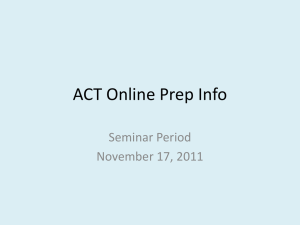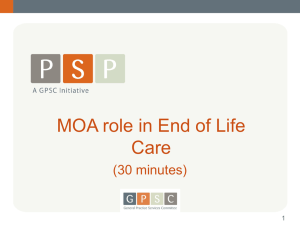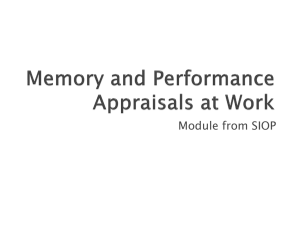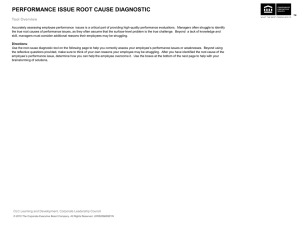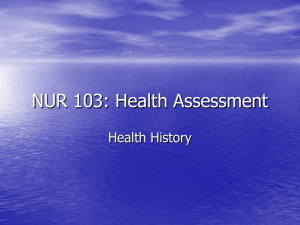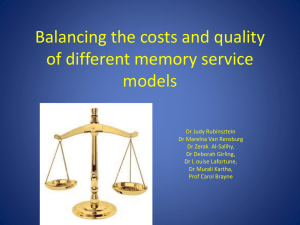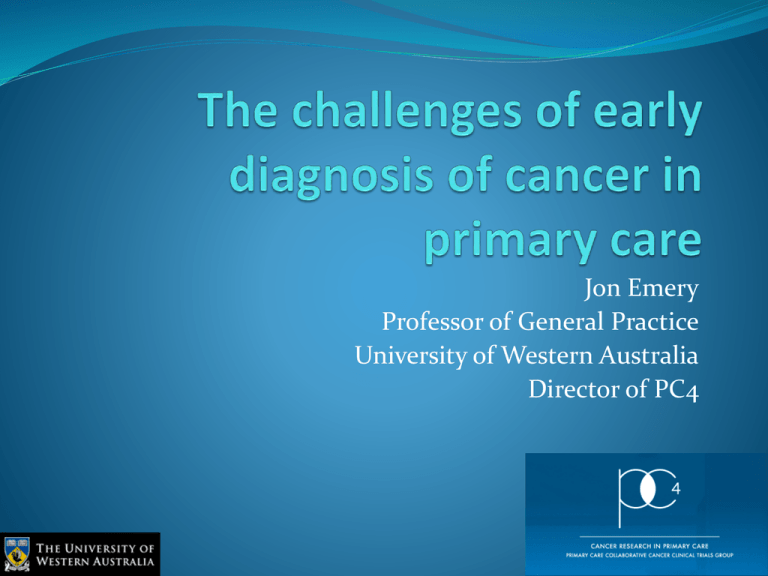
Jon Emery
Professor of General Practice
University of Western Australia
Director of PC4
Early cancer diagnosis
‘I went to see my oncologist
in hospital earlier this week
and we talked about this
and that, and the
importance of catching
cancer early, which I found a
bit annoying as they had not
caught my cancer early, but
it turned out he was just
filling in time and wanted to
talk to me about something
different.’
Onctalk.com
Cochrane review of Hemoccult screening on
colorectal cancer mortality
Symptomatic cancer and early
diagnosis
Richards et al Lancet 1999
Delays from symptoms to
diagnosis of 3-6 months
associated with 7% worse
5-year survival from breast
cancer
Effects not due to lead
time bias
Longer delays associated
with more advanced
disease
Colorectal cancer diagnostic
interval and mortality
Torring et al BJC 2010
Waiting list paradox
Diagnostic intervals >5
weeks associated with
worsening mortality if
‘alarm symptoms’.
Similar U-shaped
association for lung,
melanoma and
prostate cancer.
Variations in cancer survival
International variations in
cancer survival
Australia, Canada and
Sweden better than UK
and Denmark
Differences greatest for 1year survival
Variations in cancer survival
Rural cancer outcomes in
Australia worse
Approximately 20% worse
5- year survival for common
cancers
Differences in treatments
received (eg radical
prostatectomy Baade 2011)
Later stage at presentation
(eg colorectal cancer Baade
2011)
Can some of the variations in
cancer survival be improved by
earlier diagnosis?
Potential approaches
Improve uptake of proven screening tests
Systematic application of evidence around symptoms
as predictors of cancer
Community symptom awareness
General population
Targeted high risk groups
General practice level interventions
Tumour markers
Diagnostic aids
Models of ‘diagnostic delay’
Walter, Scott, Webster, Emery. JHSRP 2011
Models of ‘diagnostic delay’
Patient delay
Delay in primary care
Delay in secondary care
Doctor delay
First
symptom
First
contact
with the GP
Initiation of
investigation of
cancer-related
symptoms
System delay
Referral to
hospital
First visit
at the
hospital
Referral to
treatment
Treatment
initiation
F Olesen BJC 2009
Diagnosing cancer in general practice: how
well do symptoms predict cancer?
Shapley et al BJGP 2010
25 studies included
Rectal bleeding; change
in bowel habit; iron
deficiency anaemia;
haematuria; malignant
DRE; haemoptysis;
dysphagia; breast lump;
post-menopausal
bleeding.
Diagnosing cancer in general practice: how
well do symptoms predict cancer?
Hamilton BJC 2005
Improving Rural Cancer Outcomes Project
Patients with lung, prostate,
breast, colorectal cancer in
Goldfields and Great Southern
66 patients
Interview patients
Symptom appraisal and help-
seeking
Calendar landmarking and
diagram to aid recall
Medical notes audit
– Mixed methods matrix analysis
Perth
Improving rural cancer outcomes
(IRCO) project
Symptom appraisal (days)
GP interval (days)
Mean
Median
IQR
[25th, 75th]
Mean
Median
IQR
[25th, 75th]
Breast
27
0
0, 13
13
3
1, 40
Colorectal
130
9
0, 49
184
87
48, 139
Lung
36
9
0, 103
61
2
0, 9
Prostate
309
15
12, 28
33
42
10, 263
Significant overall differences between tumour groups for
symptom appraisal and GP diagnostic intervals*
* After log transformation
Symptom appraisal
and patient beliefs
Comparison of
symptoms against
personal models of
disease
Alternative
explanations for
symptoms
Common
misconceptions
about cancer
symptoms
I mean it’s like you know a
horse ,colic in a horse... it
comes on pretty damn quick
and ... you know you think
well, you know I began to
think maybe I’ve got a
twisted bowel or something.
Symptom appraisal
and patient beliefs
Comparison of
symptoms against
personal models of
disease
Alternative
explanations for
symptoms
Common
misconceptions
about cancer
symptoms
And when you’re walking
around in slushy mud and all
that your gumboots stick to
them and you’ve got to ... if you
keep doing it long enough your
hips get that sore you know?
Symptom appraisal
and patient beliefs
Comparison of
symptoms against
personal models of
disease
Alternative
explanations for
symptoms
Common
misconceptions
about cancer
symptoms
The trouble is with cancer, I
think you know it creeps in on
you and ... and like there’s a bit
of blood there but no pain and
you think well if there’d been
some pain there you’d have
definitely said oh shit there’s
something wrong here.
Symptom appraisal & help-seeking in
rural Australia
The rural Australian
character
And the country men are
worse than the women,
by a long shot. They’re,
you know, bush blokes.
You know, “I’m not going
to the doctor. I’ll be right,
mate.”
Symptom appraisal & help-seeking in
rural Australia
Fear in relation to rural
machismo
Being a real hero bloke,
you know, you don’t go to
the doctor about that.
I’m not going there …
going where they wanna
go, nup.
Symptom appraisal & help-seeking in
rural Australia
Stoic response to
symptoms
Well, I had a bit of diarrhoea…
And it just didn't want to seem
to go away… really I‘d had it for
about three months before I
went and seen the doctor… I
just put up with it … thought oh
it'll go away soon…. then I just
got sick of it. Yeah, because I
had to - I finished up wearing
um … [incontinence] pads and
things you know.”
Improving rural cancer outcomes
project
Access and Specialist diagnostic
interval (days)
Total diagnostic interval (days)
Mean
Median
IQR
[25th,
75th]
Breast
22
63
38, 100
80
15
10,29
Colorectal
55
200
125, 421
347
30
16,60
Lung
23
41
22, 203
123
14
11,30
Prostate
99
190
147, 346
357
68
53,83
Mean
Median
IQR
[25th, 75th]
Overall significant differences between tumour groups in*:
access to specialists
specialist intervals
total diagnostic interval
* After log transformation
The IRCO Trial
Community level: Community
campaign to reduce symptom
appraisal and help-seeking
intervals
Practice level: to reduce
diagnostic interval
2 x 2 factorial Randomised
Controlled Trial
Outcome: total diagnostic
interval
Approaches to reducing symptom appraisal
and help-seeking intervals
Improving rural cancer outcomes
project
Tumour markers in general
practice?
In symptomatic diagnosis
Useful: α fetoprotein, Bence
Jones protein, HCG, PSA
Uncertain value: Ca125, Ca19-9,
Of no value: CEA, Ca15-3,
thyroglobulin
Little research in primary
care populations
Sturgeon et al BMJ
2009
The BEST Studies
Sensitivity 90.0%; specificity 93.5% for
clinically relevant Barrett’s oesophagus
in primary care population
BMJ 2010. doi:10.1136/bmj.c4372
Immunohistochemistry of trefoil factor 3
(TFF3)
Diagnostic aids
Dermoscopy and sequential
digital monitoring (Menzies,
Emery et al BJD 2009)
Doubled sensitivity for
diagnosis of melanoma to 97%
63.5% reduction in excision of
benign lesions
Importance of monitoring
strategy
Diagnostic aids
The Molemate Trial
Siascopy
7-point
Major vs
features
checklist
Practice)
Change(Best
in size
Irregular shape
Irregular colour
Minor features
Largest diameter 7mm+
Inflammation
Oozing
Change in sensation
The gatekeeper role and early
cancer diagnosis
Relative 1-year survival
Median
p-value
Gatekeeper
Yes
No
67.8
73.4
Primary care 1st point of call
Yes
66.3
No
73.4
Vedsted et al BJGP 2011
0.004
0.001
What is the right balance of
gatekeeping for possible cancer?
?
? Metro only
?
Emeraldinsight.com
Acknowledgements
IRCO team
D’Arcy Holman, Vicky Gray, Emma Croager, Terry Slevin, Christobel
Saunders, Fiona Walter and others
Molemate Team
Fiona Walter, Helen Morris, Toby Prevost, Ann-Louise Kinmonth,
Per Hall and others
Discovery Team
Willie Hamilton, Fiona Walter, Greg Rubin, Richard Neal and
others
Consensus working group on early diagnosis of cancer
David Weller, Greg Rubin, Richard Neal, Fiona Walter, Suzanne Scott,
Willie Hamilton, Frede Olesen, Peter Vedsted and others

